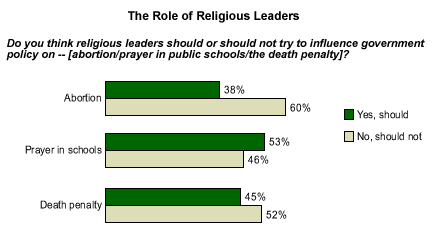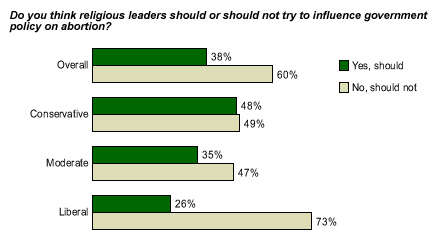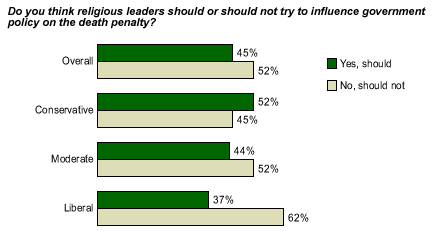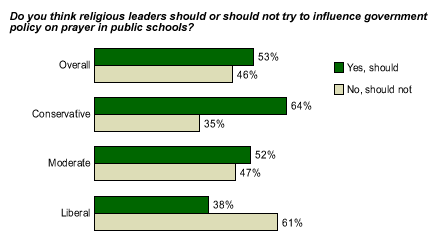Ever since western Europeans set foot on American soil, the public has wrestled with the question of whether religious leaders should influence government policy. Americans have often looked to religious leaders to provide a "moral compass" for the nation. From Jonathan Edwards' "Sinners in the Hands of an Angry God" sermon, to Martin Luther King Jr.'s "I Have a Dream" speech, Americans have historically found great value in moral commentary from religious leaders -- even as they have continued to support the separation of church and state.
Recent Gallup data reflect the ambivalence Americans continue to feel between their desire for separation of church and state and their need to trust religious leaders to provide a moral compass for the nation.
In a September 2003 poll*, Gallup asked respondents if they think religious leaders should or should not try to influence government policy on abortion, prayer in public schools, and the death penalty. By a fairly wide margin (38% to 60%), respondents said religious leaders should not try to influence policy on abortion, and by a much narrower margin (45% to 52%) said they should not try to influence policy on the death penalty. However, a narrow majority of Americans (53% to 46%) think religious leaders should try to influence government policy on prayer in public schools.

When broken down into various demographic groups, Americans' ambivalence toward these topics is even more pronounced.
Abortion
While the overall response indicates that Americans clearly do not want their religious leaders influencing abortion policy, a look at the opinions of specific religious and ideological groups reveals much less consensus among those who consider themselves to be ideologically conservative and those who attend church weekly. Among these groups, there is virtual parity -- 48% of conservatives think religious leaders should influence abortion policy and 49% think they should not; 51% of weekly churchgoers think religious leaders should influence abortion policy and 47% think they should not. But both these groups show higher levels of support for religious leaders' attempting to influence abortion policy than do those of different ideological persuasions and less frequent churchgoing habits. Ideological liberals, for example, are quite decisive -- 26% think religious leaders should exercise their influence over abortion policy and 73% think they should not.

The Death Penalty
Similarly, conservatives and weekly churchgoers are divided in their views on the death penalty.Fifty-two percent of conservatives think religious leaders should influence government policy on the death penalty and 45% think they should not. Fifty-three percent of weekly churchgoers think religious leaders should influence death penalty policy and 41% think they should not. Again, liberals are far more decisive on this issue: 37% think religious leaders should exercise their influence and 62% think they should not.

Prayer in the Public Schools
When it comes to prayer in public schools, conservatives and weekly churchgoers decidedly want religious leaders to try to influence public policy -- conservatives by 64% to 35%, churchgoers by 67% to 32%. Sixty-one percent of liberals, however, do not want religious leaders influencing policy on prayer in the schools, compared to 38% who do.

Bottom Line
While Americans see the value of the Constitution's separation of church and state, many of them also want and expect religious leaders to have some influence on government policy concerning various moral and ethical issues. However, mixed feelings even among conservative and churchgoing Americans indicate wariness at the idea of their country becoming more like a "theocracy," in which religion dominates public policy.
*Results are based on telephone interviews with 1,003 national adults, aged 18 and older, conducted Sept. 19-21, 2003. For results based on the total sample of national adults, one can say with 95% confidence that the margin of sampling error is ±3 percentage points.
